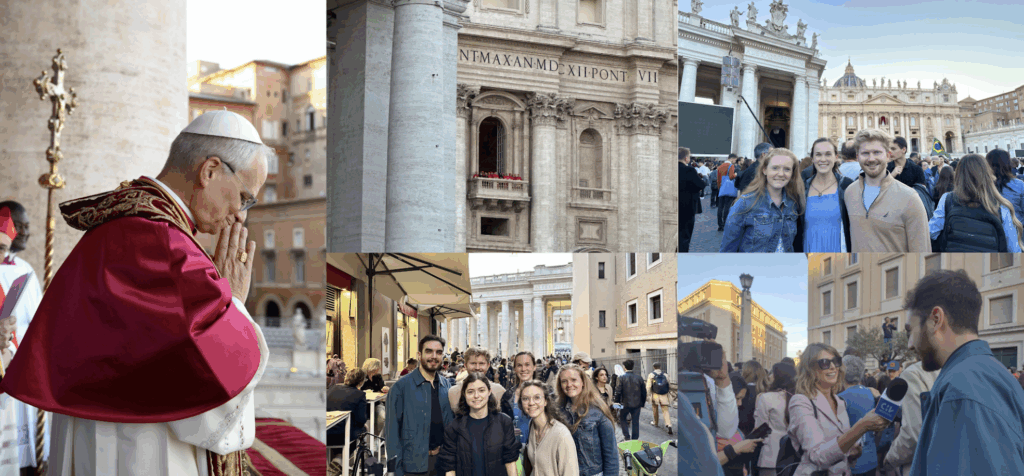
Habemus Papam!

A Great Gift From God
Habemus Papam! We have a pope! The papal election, which the Church and the world have been watching with bated breath, has been concluded, and the seat is no longer vacant. Pope Leo XIV greeted his flock for the first time yesterday afternoon, and the thousands of Catholics in Saint Peter’s Square received him with great joy.
Robert Francis Prevost was born in Chicago in 1955. He and his two brothers grew up in Chicago, and our Holy Father attended an Augustinian minor seminary for high school. He excelled in both academics and student government, was president of the student council, and was a member of the National Honor Society. After high school he attended Villanova university, studying math and philosophy and earned his Bachelor’s of science in Mathematics in 1977. He entered the Order of Saint Augustine that same year, in the province of Our Lady of Good Council. He took his first vows in 1978, his final vows in 1981, and was ordained in June of 1982. During that time he earned a Master of Divinity in Chicago, and went on to receive his doctorate in Canon Law from the Pontifical University of Saint Thomas Aquinas, also known as the Angelicum.
A good deal of Pope Leo’s priestly work was done in Peru. His first posting there, that of chancellor of the Territorial Prelature of Chulucanas, was an administrative one and lasted only a year, from 1985 to 1986. His return in 1988 kept him there longer, however, in a ten year stint as head of the Augustinian seminary in Trujillo. During that time he also taught and acted as an ecclesiastical judge. He returned to the United States in 1998 when he was elected provincial of Chicago, and a few years later was appointed Prior General of the Augustinians, the highest position in that order. He returned to Peru one final time in 2014, as Bishop of Chiclayo, before his 2023 appointment in Rome as Prefect for the Dicastery of Bishops, the organization responsible for choosing bishops around the world.

In choosing the name Leo, our Holy Father recalls to us the work of his predecessor Leo XIII. Pope Leo XIII lived in a time similar to our own, one in which the Church was struggling in its relationship to the world. The industrial revolution had swept away previous economic structures and the enlightenment had done much the same to traditional philosophy. Socialism and Communism were growing threats to the Faith, piggybacking on the exploitation of the working class, and revolution threatened many ancient European thrones.
Pope Leo XIII addressed these issues decisively in his two encyclicals Rerum Novarum and Aeterni Patris. The former dealt with how an industrial society should seek the common good, the latter with the integration of Faith, science, and philosophy.
In Rerum Novarum, Pope Leo XIII refused to capitulate to ideology, rebuking both the laissez-faire capitalists who used market theories to justify their exploitation, and the communists who used that exploitation to justify their bloody theft of other men’s property. The Pope laid out the truth clearly: private property is an undeniable right, but so is just compensation, and the actions of both extremes are unjust.
In Aeterni Patris, meanwhile, the pope set out to integrate three sources of knowledge: science, Faith, and philosophy. Modern philosophy had begun to deny the truths of Faith, and science was threatening to deny the validity of philosophy. Faith, however, did neither, and the Pope showed in his encyclical that, once again, the middle path is best. There is one truth, and just as all roads lead to Rome, so to they lead to that truth. “Advantage should be taken of science,” the Holy Father wrote, but the light of Faith completes the light of reason. Thomistic philosophy and theology, meanwhile, must not be thrown away, but cherished as a gift of God given through tradition.
As our Holy Father continues the great task of leading the Church, we are confident that he will give generously to the world from the Church’s store of wisdom as more questions arise in the face of further advances in technology. We are deeply grateful for the example of our new pope, and look forward to his leadership of the Church. We pray in thanksgiving for God’s wonderful gifts and for the intentions of our new Holy Father Pope Leo XIV.





